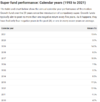- Joined
- 3 July 2009
- Posts
- 27,867
- Reactions
- 24,928
I have found, even though the drawdown is halved, our spending hasn't changed, so we still withdraw more than the minimum drawdown anyway.
Like @Junior said it is just clickbait, to keep the hate for the boomers festering, so that when the floods etc abate, the media can get back to their staple diet of the boomers and the banks.
Like @Junior said it is just clickbait, to keep the hate for the boomers festering, so that when the floods etc abate, the media can get back to their staple diet of the boomers and the banks.


